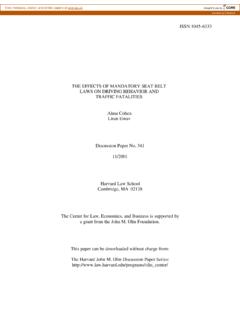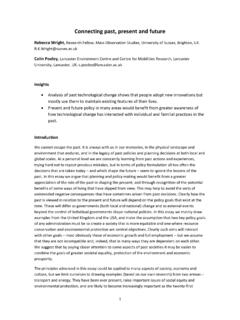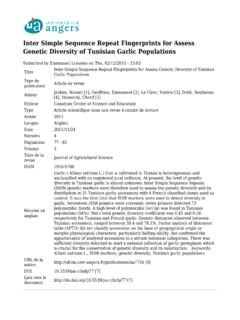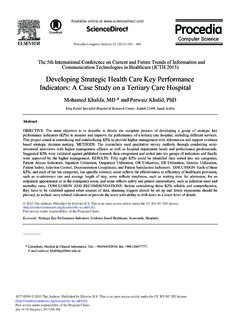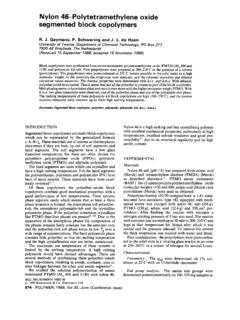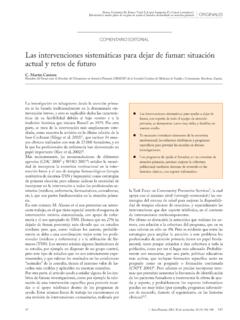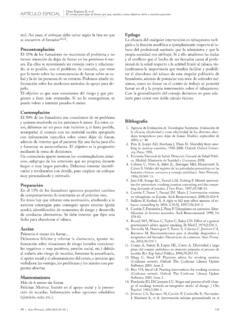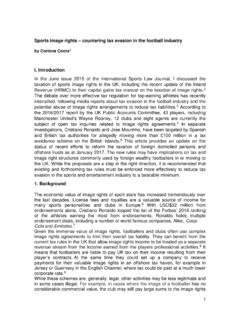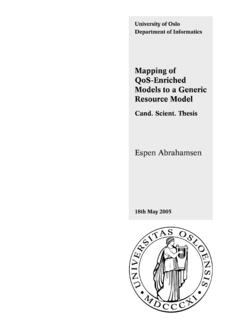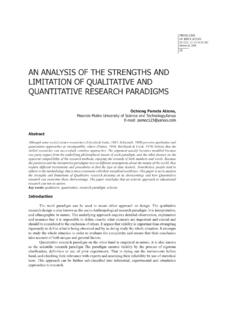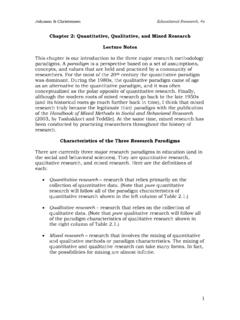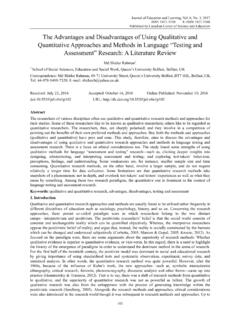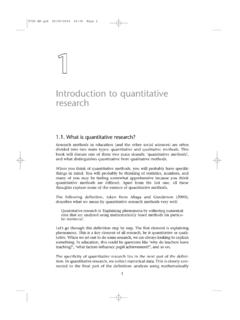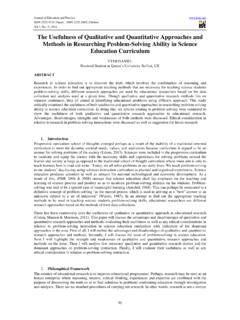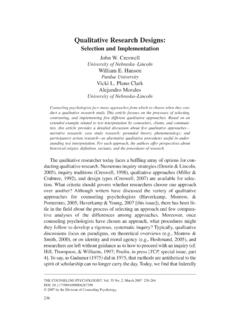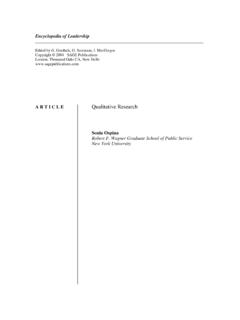Transcription of Qualitative and Quantitative Research Paradigms in ...
1 European Journal of Business and Management ISSN 2222-1905 (Paper) ISSN 2222-2839 (Online) , , 2015 217 Qualitative and Quantitative Research Paradigms in Business Research : A Philosophical Reflection Stephen Kwadwo Antwi1* Kasim Hamza2 1. School of Business, Tamale Polytechnic, Box 3 ER, Tamale, Ghana 2. School of Business, Tamale Polytechnic, Box 3 ER, Tamale, Ghana Abstract This paper attempts to discuss Quantitative and Qualitative Research methodologies within the broad field of business Research . In the light of looking for possible similarities and differences between the two approaches, the study gives an overview of the historical development of both methods, the Paradigms and interpretative frameworks, discusses major advantages and limitations and look at the new trend that combines both Quantitative and Qualitative data in a single Research project in an effort to reconcile both methods.
2 The main intention of this paper is not to extend the current and long-lasting debate regarding Qualitative versus Quantitative Research , rather to describe and reflect on the philosophical stance guiding the two Research methodologies from ontological, epistemological and methodological perspectives. The essence of this study is to enable professionals with little or no previous experience of the various Research methodologies and falling in to the trap that one Research is better than the other, gain a basic understanding of Qualitative and Quantitative Research . The study concludes that, in addition to Quantitative and Qualitative Research , mixed Research also offers an exciting mode of conducting business Research .
3 Keywords: Qualitative and Quantitative Methodologies, Business Research , Paradigms Introduction The Research methodology that was traditionally used in social sciences for several decades was the Quantitative methodology, which originated in the natural sciences such as biology, chemistry, physics, geology, and was concerned with investigating things which could be observed and measured in some way. Quantitative Research was the generally accepted Research paradigm in educational Research until the early 1980s, when the paradigm wars between advocates of Quantitative and Qualitative Research reached a new peak (Guba, 1990; Tashakkori and Teddlie, 1998). During the 1980s, many Quantitative and Qualitative researchers argued that their approach was superior.
4 Some of these researchers were purists, in the sense that they argued that the two approaches could not be used together because of differences in the world views or philosophies associated with the two approaches. This article is not an exhaustive attempt to analyze and synthesise all aspects of distinction between Qualitative and Quantitative Research methodology. However, it aims at highlighting their differences from ontological, epistemological and methodological perspectives. Thus, the study conceptualizes Quantitative and Qualitative meta-theoretical assumptions concerning the nature of the knowable or reality (ontology), views on truth and legitimate knowledge (epistemology), and how the inquirer finds out knowledge (methodology).
5 A critical analysis and synthesis of previously published materials are employed, with the view of assisting and empowering business researchers to understand the true distinction between Quantitative and Qualitative Paradigms . Bryman (2001: 106) suggests that the distinction between Qualitative and Quantitative Research perspective is really a technical matter whereby the choice between them is to do with their suitability in answering particular Research questions . Following this suggestion, it is not the aim of this section to justify which Research method is superior to the other. The study, however, interrogates the incompatibility thesis of the two inquiries resulting in the either-or position.
6 The rest of the paper is organised as follows: the next section looks at the literature review; it contextualizes the distinction between Qualitative and Quantitative Research from the ontological, epistemological and methodological perspectives. The last section concludes and summarises the review. Literature Review All Research is based on some underlying philosophical assumptions about what constitutes 'valid' Research and which Research method(s) is/are appropriate for the development of knowledge in a given study. The selection of European Journal of Business and Management ISSN 2222-1905 (Paper) ISSN 2222-2839 (Online) , , 2015 218 Research methodology depends on the paradigm that guides the Research venture.
7 The term paradigm originated from the Greek word paradeigma which means pattern and was first used by Kuhn (1962) to denote a conceptual framework shared by a community of scientists which provided them with a convenient model for examining problems and finding solutions. According to him, the term paradigm refers to a Research culture with a set of beliefs, values, and assumptions that a community of researchers has in common regarding the nature and conduct of Research (Kuhn, 1977). A paradigm hence implies a pattern, structure and framework or system of scientific and academic ideas, values and assumptions (Olsen, Lodwick, and Dunlop, 1992).
8 In simple terms, it is an approach to thinking about and doing Research . According to TerreBlanche and Durrheim (1999), the Research process has three major dimensions: ontology, epistemology and methodology. According to them a Research paradigm is an all-encompassing system of interrelated practice and thinking that define the nature of enquiry along these three dimensions. Guba and Lincoln (1998) stated that a Research paradigm is intrinsically associated with the concepts of ontology, epistemology and methodology. They suggested that a Research inquiry should be based on the concepts of ontology ( , the way the investigator defines the truth and reality), epistemology ( , the process in which the investigator comes to know the truth and reality) and methodology ( , the method used in conducting the investigation).
9 According to these researchers, the answer to questions regarding these three elements provides an interpretative framework that guides the entire Research process including strategies, methods and analysis. Ontological Issues in Business Research The term Ontology is from two Greek words (onto, which means being and logia, which means science, study or theory . Ontology refers to a branch of philosophy concerned with articulating the nature and structure of the world (Wand and Weber, 1993, p. 220). It specifies the form and nature of reality and what can be known about it. There are two broad contrasting positions objectivism and constructionism; objectivism holds that there is an independent reality and constructionism that assumes that reality is the product of social processes (Neuman, 2003).)
10 The positivist paradigm of exploring social reality is based on the philosophical ideas of the French Philosopher, August Comte. According to him, observation and reason are the best means of understanding human behaviour; true knowledge is based on experience of senses and can be obtained by observation and experiment. At the ontological level, positivists assume that reality is objectively given and is measurable using properties which are independent of the researcher and instruments; in other words, knowledge is objective and quantifiable. Positivistic thinkers adopt scientific methods and systematize the knowledge generation process with the help of quantification to enhance precision in the description of parameters and the relationship among them.
